On the Notorious Final Clubs that Wouldn?t Have Me as a Member
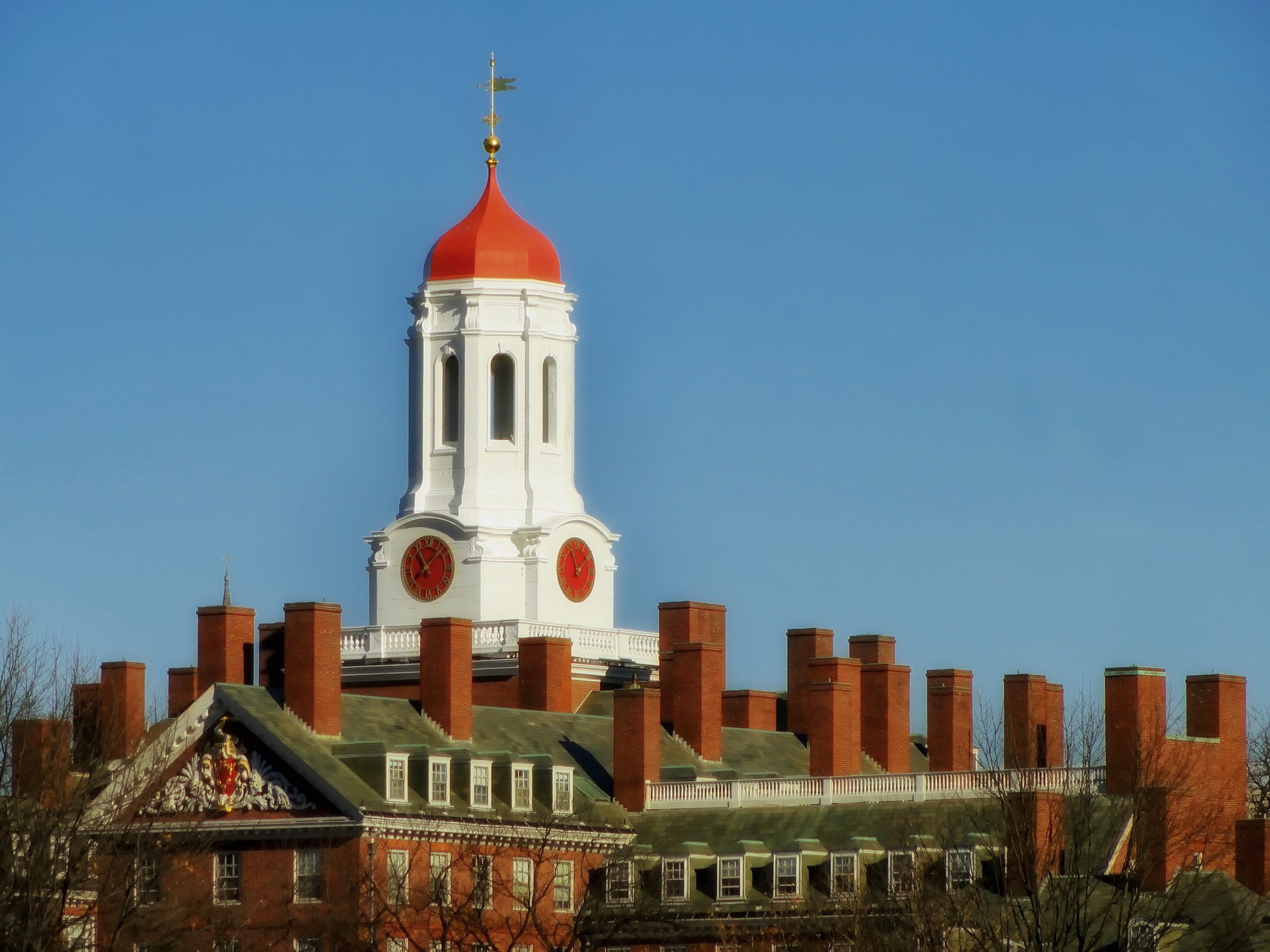 Dunster House, my sophomore dormitory at Harvard
Dunster House, my sophomore dormitory at Harvard
[TW: this piece discusses sexual violence at Harvard, and I link to two first-person accounts of it. If you find this topic triggering, please take care while reading.]
Also, this is Part II of a series. Part I can be found here.
During my time at Harvard, I was denied access to two privileged spaces.
The rejection from one of these spaces, the infamous comedy magazine The Harvard Lampoon, came on four separate occasions, each one an increasingly painful blow to my sense of self-worth.
Looking back, they were some of the most formative moments of my life.
First, let me tell you about a rejection that was ultimately a relief.
Final clubs at Harvard were given that name because at one point in their long history ? the oldest one, The Porcellian, was founded in 1791 ? the main objective was to rise through lesser clubs on the way to membership in a ?final? one, the few most prestigious organizations.
Now, undergraduate men are generally accepted to only one club, if any, during their undergraduate years. The clubs have almost always been all-male, save for some recent mostly failed experiments by three of the clubs to go co-ed. In fact, the reason final clubs cut official ties with the university in 1984 is because they wanted to remain all-male.
The ?punch? process starts at the beginning of sophomore year, the first time Harvard men (or boys) are eligible for entrance into the clubs. ?Punch? is the non-fraternity version of ?rush,? and ?punches? are narrowed down through a series of social events.
It?s a multi-part process steeped in ancient, meaningful rituals.
I?m kidding. It?s both a popularity contest and measure of privilege centered around an unimaginable level of drinking.
Final clubs like to think of themselves as better than fraternities ? better than everyone, frankly ? but they?re exactly what you would expect from elitist, all-male organizations.
They?re also ground zero for rape culture on Harvard?s campus.
When my brother punched The Fox at the beginning of his sophomore year, he desperately wanted a place to socialize. Having met the friends who he made during his freshman year, lovely people many of whom are now lifelong friends of his, I wondered why he needed anything else out of the Harvard experience.
I had not yet been inured to the psychological hold that final clubs maintain on Harvard?s campus.
Here?s how a Friday night goes for many freshman and sophomores. During dinner in the dining hall, you mutter to others, asking about their potential plans. The few students who are lucky enough to have plans don?t necessarily want you in on them ? they want to be exclusive.
Around 8pm, you wander around the River Houses, the upperclass dorms between which many clubhouses are nestled. They aren?t an official part of campus, owned by the many wealthy alumni of the clubs who don?t want the College intervening in a critical part of their history. Some of these grown up club boys can be found on Harvard?s campus in various positions of prestige, and many are on alumni boards who pull the strings (read: money) of Harvard?s administration. These are only two of the reasons these literal old boys clubs refuse to be buried deep in the earth like so many misogynistic artifacts of the past, turned into fossils so our grandchildren will one day marvel and say, ?Is that how awful we used to be??
Nope, final clubs will outlive us all, passing on their sexist traditions, songs, and bawdy jokes to the next generation of future investment banker bros and elitist dirtbags.
You and your friends wander by one of these edifices of should-be antiquity.
?You think we can get in?? someone says.
?I?m in Ec-10 with Will Winthrop,? another says, referring to a club member he?s only vaguely familiar with.
Your group walks up hesitantly to the door, only to find a bouncer ? one of the members or oftentimes an actual hired bouncer.
What happens next is one of the most awkward, painful exchanges on campus.
?Yeah, we know Will? um, William Winthrop. Yeah, the dorm is named after his great-great-grandfather. We?re pretty good friends, so??
Before you can utter another word, the bouncer taps the most attractive young woman in the group, then her roommate who is visibly inebriated. Without time to wonder why you turned down the pregame vodka shots in their room, the door slams on you and the rest of the group.
You try texting the two who got in, but it?s no use. The members would never let the rest of you in, and you suspected that at the start of the evening.
?Maybe it works differently,? you had hoped. ?Maybe the guys in the club are decent human beings.?
It doesn?t, and they?re not.
Before anyone tries, ?Not all final club members?? on me, yes, I recognize there are a few decent people within these awful organizations. I was friends with some.
It doesn?t excuse the fact that the clubs propagate elitist, misogynist culture on campus. Even if you consider yourself a good man, if you are accepted to and join a final club, you are knowingly participating in a harmful group for your own benefit, which includes access to parties first and alumni networks later.
Good men who do nothing to push back against rape culture and toxic masculinity are complicit in their continued existence.
Good men who participate in final clubs at Harvard are not only complicit, but they are also active participants in rape culture?s firm grasp on campus.
How bad of a problem is it, many ask? It?s really bad, but Harvard downplays it every chance they get. When I gave campus tours, I was instructed to not refer to the clubs? existences. If I was asked directly, I was supposed to say that they were such a tiny part of campus life and change the subject, acting like they barely existed.
They do, and the impact they have is sizable.
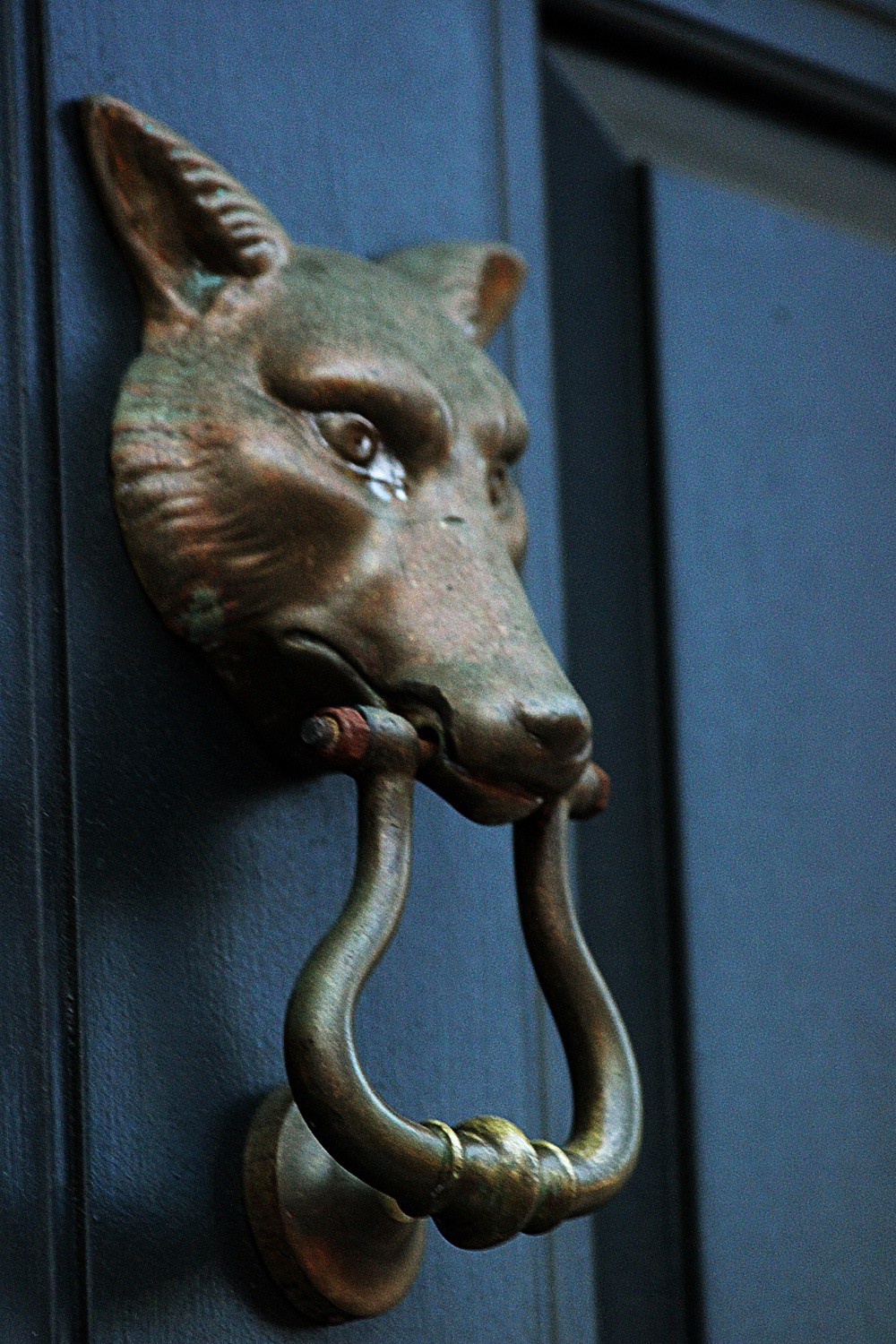 Door knocker at The Fox Club (photo by Crimson staff writer Thomas W. Franck)
Door knocker at The Fox Club (photo by Crimson staff writer Thomas W. Franck)
I?ve never talked to my brother about why he quit The Fox.
After being accepted his sophomore year and spending most weekends partying there, including one where I visited and he gave me an illegal tour of the clubhouse (illegal because only members are allowed on the upper level), he stopped attending events there. For one, he turned twenty-one at the beginning of his junior year, so he could legally go out with friends to bars in Cambridge.
By senior year, he stopped going altogether. He advised me that when time came to ?punch? clubs, I should consider not doing it.
?But I would automatically get in,? I told him, knowing the rules that being immediate family meant instant access and acceptance, though the punch process still needed to be completed.
?Okay,? he said. ?It?s your choice. I?m just telling you I don?t think it?s worth it.?
It didn?t seem fair. I was a lowly freshman, desperate for a place to fit in and call my own. I had no idea about the dark side of final club culture.
Was my brother just trying to keep me out of ?his? club? The Fox was known as one of the lowliest final clubs, reserved for those who were not wealthy, privileged, or connected enough to get into the ?better? ones.
But it was still better than nothing, my nave freshman brain thought.
So I was ecstatic when the following fall, an envelope with a fancy wax seal was slipped under my dorm room door.
In order to be considered for a final club, one must be ?punched,? not literally, by a current member. Then, the multi-round ?punch? process begins.
I don?t know who punched me for The Fox, but I was grateful. My brother who graduated in the spring still had a few friends there, though I didn?t know he?d also made some enemies.
The first event took place in a swanky members-only social club nearby Boston Common. This wasn?t a Harvard club, but a selective institution for the city?s elite, sort of like The Heritage Club in the 1983 film Trading Places.
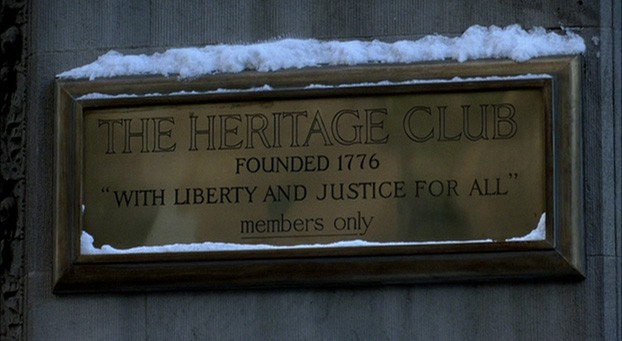
I took the T into Boston, then walked up the hill past the Statehouse, searching for the address on the elegant invitation.
Stepping into the large ballroom of the club, I instantly tensed. I hated large social gatherings where I didn?t really know anybody, and the expressed purpose of this gathering was to make myself known to the members. They stood around dressed in blazers and sporting green ties and bowties embroidered with golden foxes. Punches approached them, shook hands, and forcibly socialized.
You know that feeling when you enter a space and realize right away that you?re out of place?
This was that, times a million.
I wear my heart on my sleeve. I?m an emotional, sensitive person. I find it painful not only to act phony but to witness phony behavior.
I found a fellow punch who I semi-knew and attached myself to him, as if he was a lifeboat. He moved around and socialized, but I sort of hid in plain sight. I would stand next to the food table as if I was just about to grab a snack, or face a wall while eating, trying to look like I was thoroughly occupied.
It didn?t matter, I reasoned. I was automatically in, so why force myself to be uncomfortable?
The conversations I overheard were painful. The worst one, however, the one that made me leave and decide I would never ever attend another punch event (even though I ultimately did) was between two members.
These two handsome white upperclassmen with their embroidered Fox ties checked in with each other for a chat. One had just been speaking with an African-American punch.
?He?s one of the good ones,? he told the other member, nodding in the punch?s direction.
Was this really real? I asked myself. How could it be?
I grew up in a diverse neighborhood where racism existed but didn?t seem like the norm. It was talked about as something distant, ?Oh yeah, Dave?s dad yelled at him for dating Alejandra. What an asshole.?
Then I was confronted with it at Harvard, a place where I navely assumed people would be empathetic and enlightened. Because education, right?
I left the event and called my dad as I walked to the T-station.
?That?s awful,? he said.
I ranted for the next five minutes about what a pretentious, horrible gathering it was, how it seemed like something out of the 19th century, not 2004.
I told my dad I was quitting the punch process.
Yet, when the next envelope was slid under my door, I felt special just to be chosen again, especially on a campus where I felt so different, not least because of the onset of a debilitating chronic pain disorder that would soon become part of my daily life.
Looking back, it was my own white privilege that allowed me to ignore that overt racism.
?They were complimenting the punch,? I reasoned. ?It was sort of a good thing.?
Days later, I awoke early in the morning and got dressed for the second punch event: the outing.
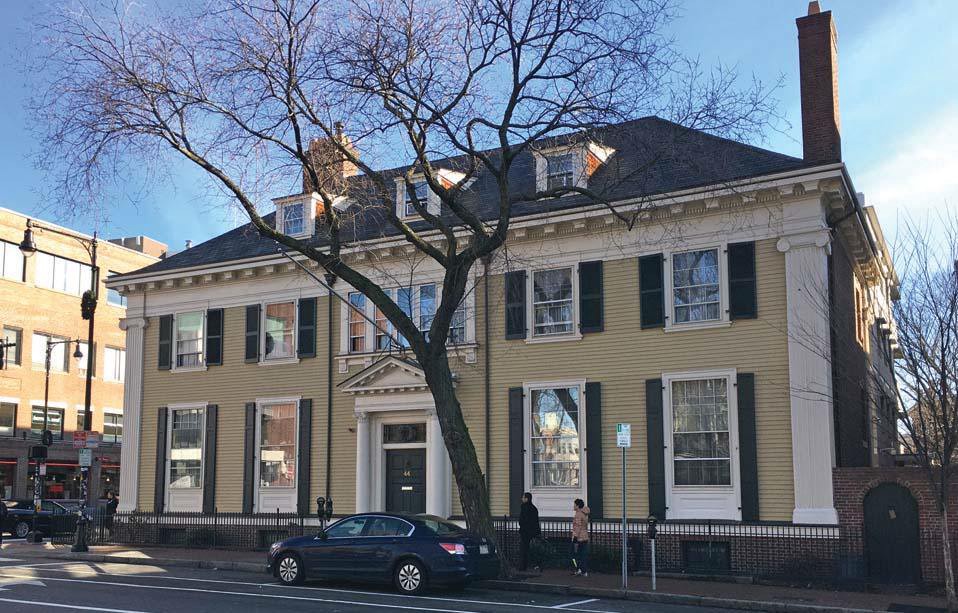 The Fox Club (Photograph by Harvard Magazine/JC)
The Fox Club (Photograph by Harvard Magazine/JC)
Since the first round of elimination was complete, a few less punches loaded onto a yellow school bus in front of The Fox Club early one Saturday morning.
We had been invited to have breakfast and drinks in the basement of the club beforehand, but I decided not to go. I wasn?t much of a drinker, and I didn?t want to find myself in another situation of having to socialize with the members.
By this point, I realized that my desire not to be around the members probably meant that I shouldn?t be in the club, but I figured what the hell, I?d keep going to punch events and maybe something would click.
Packed into the school bus with members and punches who were already drunk and rowdy, my anxiety kicked in. I wanted to leave, to get off the bus, but we were already on the Massachusetts Turnpike heading westward.
?Where are we going?? I asked another punch, feeling more and more terrified that there was no way to escape the situation.
?I don?t know,? he said. ?I think to one of the alum?s houses.?
?Where??
He shrugged.
Panic set in. A few times a day, I was getting struck with what I could only describe as pain attacks, thirty seconds to two minutes of unbearable pain, starting in my left cheek then enveloping my entire head and neck. These were somewhat new, and I was extremely self-conscious about them. I tried to keep them a secret, not wanting anyone to know I was flawed, and my best friend and roommate didn?t even know about them yet. Each time I was stricken with one, I would try to hide, finding a secluded place like a bathroom to suffer in silence.
That day, I suddenly found myself on a bus of undergraduate men, for an undisclosed amount of time, traveling God knows where, to do who knows what for an entire day.
There was no escape.
I cursed myself for agreeing to go on this outing, convinced that I would have been better off to listen to my conscience. Maybe it was my punishment, I reasoned.
 Packed with drunken undergrads. What could go wrong? (Photo by Guilherme Rossi from Pexels)
Packed with drunken undergrads. What could go wrong? (Photo by Guilherme Rossi from Pexels)
Soon into the ride, the guys started passing around bottles of Goldschlger and Jgermeister, two of the most objectionably flavored liquors in existence. One has flecks of gold and artificial cinnamon flavor, the other tastes like regret.
As my breathing grew shallow and panic worsened, I saw alcohol as a possible solution for the first time in my life. Sure, my doctors had cautioned me not to drink much or at all because of my complex medical condition and many medications, but to be fair, they?d never been stuck on a school bus with a crowd of smug, cackling dude-bros.
While I avoided alcohol entirely my freshman year, that morning on the bus seemed as good of a time as any to embrace it.
I began swigging shots from the communal bottles, fears of germs and oral herpes be damned.
I loosened up. The panic subsided. When I was hit with my first pain attack of the day, I lowered my head in the bus seat and rode it out.
Nobody noticed. Everyone was too drunk to care.
It was a spectacular feeling, despite the way my temples throbbed in the wake of the attack.
The members started singing songs, old tunes written about the ?gentlemen? of The Fox Club. It was clear they all saw themselves this way, and not as a group of teens and early twenty-somethings getting shit-faced on a yellow bus early in the morning.
Then the joke contest began. The point was to tell the most offensive joke possible. Nothing was off limits, not race or religion or dead babies or rape or childhood sexual abuse. Never mind that there were a handful of people of color on the bus, including a member or two. Never mind that someone in the group might have suffered abuse as a child.
A joke was a joke, and the entire point was to be offensive. That was the game.
Now I know that telling an offensive joke is a privilege, a sign that you belong to a protected class and the butt of the joke doesn?t.
The joke I told, which was awful and racist towards Asians, got zero laughs, and not just from the Asian-American punches. It wasn?t offensive enough. I felt emboldened by alcohol but the sting of rejection still hurt.
I can?t even remember the ?best? joke, but I remember who told it. He was a charismatic punch whose older brother was in the club, but I suspect he would have been accepted anyway. He might have even made the leap to a more prestigious club later on, I can?t recall.
We arrived at a Fox alum?s estate in Harvard, Massachusetts. It was a nice-sized house but nowhere near the mansion I envisioned. The property was sprawling, a large hillside cleared of all brush with a nicely manicured lawn, even for a chilly fall day. There was a small, manmade lake on the property, into which several drunken members and punches stripped naked and launched themselves into throughout the day.
The day?s activities were all outside, the most important one being continuous boozing thanks to an ample supply of beer and liquor.
But there were also feats of strength, sporting events like a game of shirts and skins tackle football. Really manly men stuff.
I participated in none of it, awkwardly standing off to the side, nursing a beer so I could maintain my minor buzz throughout the day.
At one point, the alum passed out cigars. This was an area I had a bit of experience. The historic Cambridge tobacconist Leavitt & Pierce was across the street from my freshman dorm, and I would mosey in once in a while and talk to the owner about cigars. He knew so much, and cigars appeared to be as complex as wine. There was craftsmanship that went into creating the good ones, from the curing and aging of tobacco to the selection of filler, binder, and wrapper.
Mostly I liked getting a buzz from smoking one.
The alum passed me a moderately expensive cigar, a brand I was familiar with.
I turned to a member. ?These are nice,? I said and began discussing where they were made and the qualities of the smoke.
The member?s drunken face twisted and contorted.
?Shut the fuck up and smoke it!? he said, angrily biting off the tip and spitting it on the ground. He took another member?s cigar and lit his with it.
I, on the other hand, used a cigar cutter, lit it gently with matches, and smoked it by myself.
?Alright, let?s go!? one of the members yelled as the sun dipped back over the hills of Western Massachusetts.
What happened next is a moment forever burned into my memory.
?Everybody take a piss!? someone else yelled.
Everyone seemed like they knew what to do. I followed along as they spread to the outskirts of the property, pulled out their penises, and urinated.
An entire group of guys, collectively taking a piss ? farting, hollering at each other, and moaning with relief.
?This is like Lord of the fucking Flies,? I thought to myself as the pee dribbled out of me. My body wasn?t totally cool with or drunk enough to urinate freely in that situation.
On the bus, my buzz faded and my need to pee ? to really pee ? increased. I watched some guys pee into bottles and toss them out the window.
When the bus mercifully arrived in front of the club, I jumped out and sprinted back to my dorm. The relief of peeing when I got back preceded another pain attack, but I didn?t care.
I recognized that I didn?t say goodbye to or thank any of the members for the outing. It didn?t matter, not because my entrance was automatic, but because I?d never have to socialize with them ever again.
My first realization that I was rejected came when my roommate and I ran into a friend in our upperclass house?s dining hall. He told us about the third Fox punch event.
The third one already happened? I wondered to myself.
I guessed it had. Weeks had gone by, but no invites were slid under my door.
I called my brother.
?That?s weird,? he said. ?I?ll check it out.?
What I found out upset me at the time, though I?m grateful for it now. It?s also hilarious.
I had been blackballed.
The term comes from an old method of voting. Members would put a red ball into a box when voting on a punch. If there was even one black ball, the punch was denied. It didn?t matter if the punch was a legacy; a blackball was enough to keep him out. It?s also rumored that members get just one black ball to use in their entire life.
Despite having plenty of relatives who had been members of The Porcellian including his cousin Teddy, Franklin Delano Roosevelt was perhaps blackballed from The Porcellian, the most exclusive club at Harvard.
During middle age, FDR declared that not being punched by The Porcellian was ?the greatest disappointment in [his] life.?
Said the man who chose not to intervene on the genocide of the Jewish people, but okay.
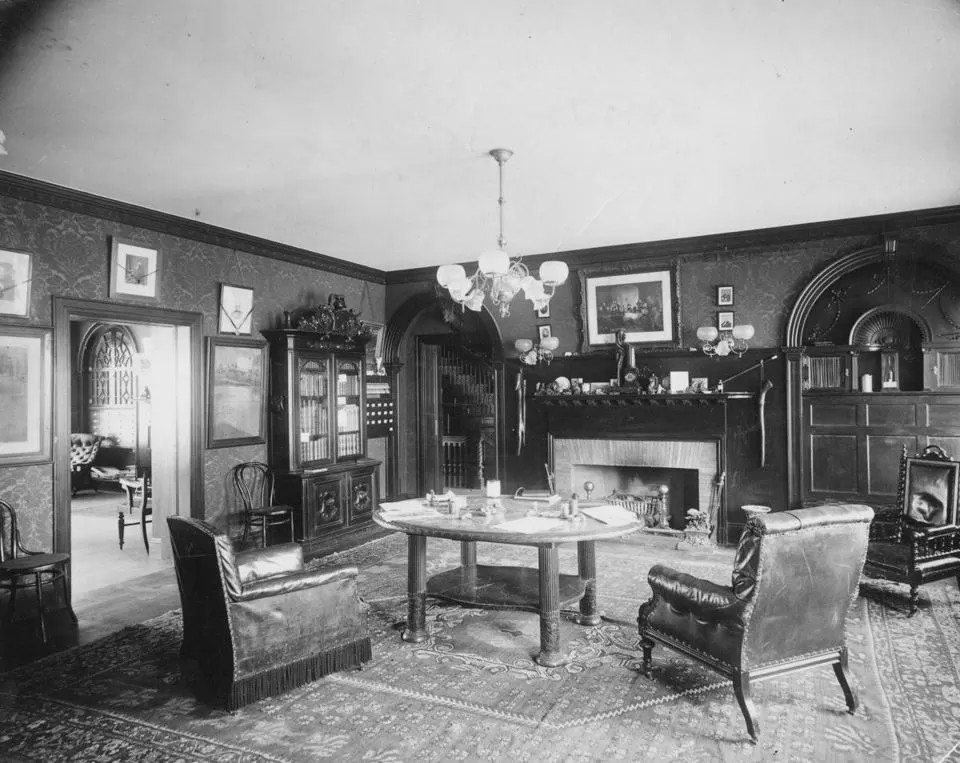 Porcellian interior, 1909
Porcellian interior, 1909
My point is that entrance and prohibition from the clubs have historically carried weight.
When I discovered I was blackballed, I recall feeling a momentary sadness at the rejection. For over a year, I?d been concerned by not fitting in with my classmates at Harvard, and this confirmed it.
However, the more I thought about it, the more relieved I was.
I really didn?t like those guys. The first two events were painful. I was suddenly proud to be rejected from a group that espoused racist and misogynistic ideas.
Also, the guy who blackballed me was perhaps one of the most objectionable people I ever met at Harvard ? a smug, elitist prick. What an honor that this garbage pail of a human decided that I was his opposite and therefore undeserving of membership to his club.
I understood why. I was in another campus organization with him, and let?s say my brother had not been entirely respectful of this sentient amalgam of cow shit and Axe Body Spray, a guy who also formed a reputation of being inappropriate with women ? shocking, right?
I kept my distance from The Fox Club, save for a literal run-in one night during senior year.
?Come to The Fox!? my friend texted me.
It was almost 3am on a Saturday night during the spring of my senior year, and a final club was the last place I wanted to be. My friend, let?s call her Kat, had been trying to get me to come out for a few hours that night. Kat was fun and social, but on that night I?d been feeling decidedly un-fun and anti-social.
She went to a few bars with some of our mutual friends, texting me updates through the night.
?Who?s there?? I texted back when she told me she was at The Fox.
?Just me,? she said.
I sat up in my bed. Kat was tough and able to take care of herself, but being drunk and without your friends at a final club at 3am is not an ideal situation for anybody.
?I?ll come over,? I texted.
She replied something like, ?Yayy,? and I put some clothes on, then headed out.
My dorm was only about five minutes from the club. I walked down the steps towards the entrance to the basement, the place where non-members were allowed to party. I knocked.
A drunk, fresh-faced kid, I?m guessing a sophomore member, answered the door.
?Yeah?? he said.
?I?m here to meet a friend,? I said.
?What?s his name??
?Not a member, I?m picking her up.?
?Who??
?Dude,? I said, losing my patience but trying to be friendly, ?let me in for fifteen seconds, and I?ll be out of your hair.?
?Fine,? he shrugged and let me in.
The dimly-lit basement wasn?t crowded and smelled of stale beer. Some guys played beer pong, others sat around.
I spotted Kat talking to two members. She was the only woman I saw in a basement of twenty or more men.
?Hey! Steve!? she said.
I walked over and gave her a hug. ?We should go,? I whispered into her ear.
?Why? This is fun,? she said. She was very drunk.
I made up some excuse about how I had told one of our other friends that we would meet them to get some late-night food.
?Oh, cool,? she said, as we walked together towards the exit. I didn?t even make eye contact with any of the members as we left.
Would Kat have been okay that night on her own? Probably, but I didn?t want to take any chances. I?m not trying to act like I?m some sort of savior. I just didn?t want my friend to be alone in the basement of a final club in the middle of the night. She had arrived at the club earlier with friends who had since left, and I figured that not staying was probably a better idea than staying.
Outside, I told her that I made up that story about meeting up for late-night food, but asked if she was hungry. She wasn?t, so I walked with her back to her dorm.
Do final clubs exist only so that members can sexually assault their classmates? No.
But would there be less sexual assaults on campus if these elitist, limited-access clubhouses ceased to exist?
Without a doubt.
In 2016, Harvard?s Task Force on Sexual Assault Prevention released a report that placed the lion?s share of blame for rape culture on the ?deeply misogynistic attitudes? of final clubs on campus.
The results of a campus-wide survey on the ?sexual climate? at Harvard were most damning.
Forty-seven percent of senior women at Harvard who participated in the final club social scene reported ?experiencing nonconsensual sexual contact since entering college.?
In other words, one of every two female Harvard undergraduates who socialized at final clubs were sexually assaulted.
Compare this to the thirty-one percent of all Harvard women who reported experiencing the same, which is itself an alarmingly high number, considering the national average amongst undergraduate women is twenty-three percent.
Thus, the percentage of women socializing within final clubs who are sexually assaulted is more than double the national average: 47% versus 23%.
The existence of these clubs on Harvard?s campus makes undergraduate women less safe, yet the university seems powerless and perhaps unwilling to commit to creating meaningful change.
Campus-wide sexual violence is a larger-than-average problem at Harvard. I mentioned in the last piece how Harvard caters to its students in many ways, so it would seem reasonable to assume that the university does everything in its power to protect and care for its undergraduates, right?
Not in many cases of survivors of campus sexual assault.
Why? Because the university cares most about protecting itself.
As outlined in the devastating documentary The Hunting Ground, one word matters most to administrations when assessing reported cases of sexual violence on campus:
Liability.
The university wants to know how likely it is that they could get sued if the family of a student perpetrator decides to retaliate for his or her punishment.
Consider, then, the amount of privileged students from wealthy, powerful families who populate the membership rolls of final clubs.
When survivors of sexual violence understand that an institution has a reputation for protecting perpetrators, there is far less incentive to report. This appears to be the case at Harvard, where 80% of female students who ?experienced nonconsensual penetration by incapacitation? (meaning they were raped while inebriated or drugged) and 69% of those raped ?by force? choose not to report.
Despite such low rates of reporting, Harvard still had the highest number of reported campus rapes of any college in Massachusetts in 2014.
You might figure that Harvard would be better outfitted than most universities to provide support to survivors who decide to report.
They are not, as explained in this anonymous survivor?s op-ed.
?It’s Me, One of Your Statistics | Opinion | The Harvard Crimson
College campuses are notorious for their high instances of rape and sexual assault. Yet my university, the greatest and?
www.thecrimson.com
As an undergrad, I heard whisperings of classmates who had been victimized. The endings of these stories were always that the university gave abysmal support. Perpetrators thrived, while survivors often ended up begging the school to take any kind of action. The administration routinely refused even basic requests like switching an assailant?s dorm so he would not live in close proximity to the person he hurt. Some brave students penned anonymous op-eds as a last resort.
The longer I was a student at Harvard, the more I became aware of these issues, yet I had no idea of the true scope of the problem.
Sexual assault and rape are crimes of power and control. The perpetrator rejects the bodily autonomy of the victim, choosing to forcibly exert their own desires.
The setting of the final club is itself an arena of power and control.
The members themselves are the only ones allowed full access to the clubhouses. Guests are screened, granted partial access but only if they are deemed worthy. Members also control the flow of alcoholic beverages, which might be beer, liquor, and/or purposely potent punch.
The balance of power is tipped heavily in favor of the members. Those that are predators can easily treat guests like prey.
Add privilege and entitlement to this already toxic atmosphere, and you have an environment where assault and rape can thrive.
Is it any surprise that within the walls of final clubs, elite all-male organizations under no jurisdiction from the university itself, that sexual violence is far more common than the rest of campus?
My third reason in this ongoing series on why not to attend Harvard is because final clubs still exist, and there seems to be no sign of that changing anytime soon.
Harvard has enacted increasingly toothless sanctions on club members, which supposedly prevent them from holding leadership positions in campus groups or athletic organizations, and precludes them from College recommendations for fellowships and awards like the Rhodes Scholarship.
Most of the clubs have collectively shrugged their shoulders.
Three clubs decided at first to adopt gender-neutral policies to avoid the sanctions, but it didn?t last.
When The Fox Club decided to admit women in 2015, graduate members revolted, threatening to shut down the club entirely. Less than two years later, The Fox returned to its all-male roots and cancelled the membership of the women it had admitted.
The reality is that alumni of the more prestigious clubs wield incredible power over the university. They wield incredible power ? period ? and they don?t want anything to change about their beloved Harvard clubs.
In a truly astounding display of hubris, an alumnus of The Porcellian (PC) argued that allowing women to become members of their club would increase instances of sexual misconduct. The supremely silly argument hinges on the fact that at least for The PC, women aren?t allowed in most spaces of their clubhouse. So if the rules say women can?t be inside most of it, surely that means sexual assault is never perpetrated by any members, right?
It?s an argument that I believe is intentional trolling, since PC members and alumni perhaps rightfully view themselves as untouchable.
Other final club alumni are clapping back, too.
Just in case you don?t yet believe that these groups exert actual power and have alumni that will do whatever it takes to keep the dinosaur clubs on campus, recognize that last year, an umbrella group called The Cambridge Coalition lobbied Congress to pass a bill that would end Harvard?s sanctions. The Cambridge Coalition is made up in large part by three of the most elite final clubs on campus: The Fly, The A.D., and The Porcellian.
Social Groups Spent $90,000 Lobbying Congress to Cancel Sanctions in Second Quarter of 2018 | News?
Two organizations led in part by members of Harvard final clubs spent $90,000 in the second quarter of 2018 lobbying?
www.thecrimson.com
These lobbying organizations and others like it are spending lots of money so that members of Congress will tweak the wording on a pending education bill to make Harvard?s current sanctions illegal.
Of course, the bill (known as The PROSPER Act) does a heck of a lot of other stuff, but that?s not what the Cambridge Coalition cares about.
They only care about making it illegal to put sanctions on their precious final clubs, and their lobbying efforts may be successful.
Final clubs spending money to influence Congress over a few lines of text in a massive bill is emblematic of a larger problem.
It?s symbolic of the absurd amount of privilege that still thrives at Harvard, where a small group of students can have such a large affect on campus life.
Harvard loves to downplay the role of final clubs on campus, claiming that they are a small and insignificant part of undergraduate life, but they?re not.
The fact that these disgusting, misogynistic organizations represent any fraction of undergraduate life is enough for me to recommend avoiding the school entirely. I understand that Greek life exists at many schools, and I?m opposed to that as well, but final clubs are a uniquely awful type of group.
All things being equal, I would choose to go to a school where these antiquated clubs don?t exist.
Where exactly would that be? Anywhere but Harvard.
Read Part I of this series here:


